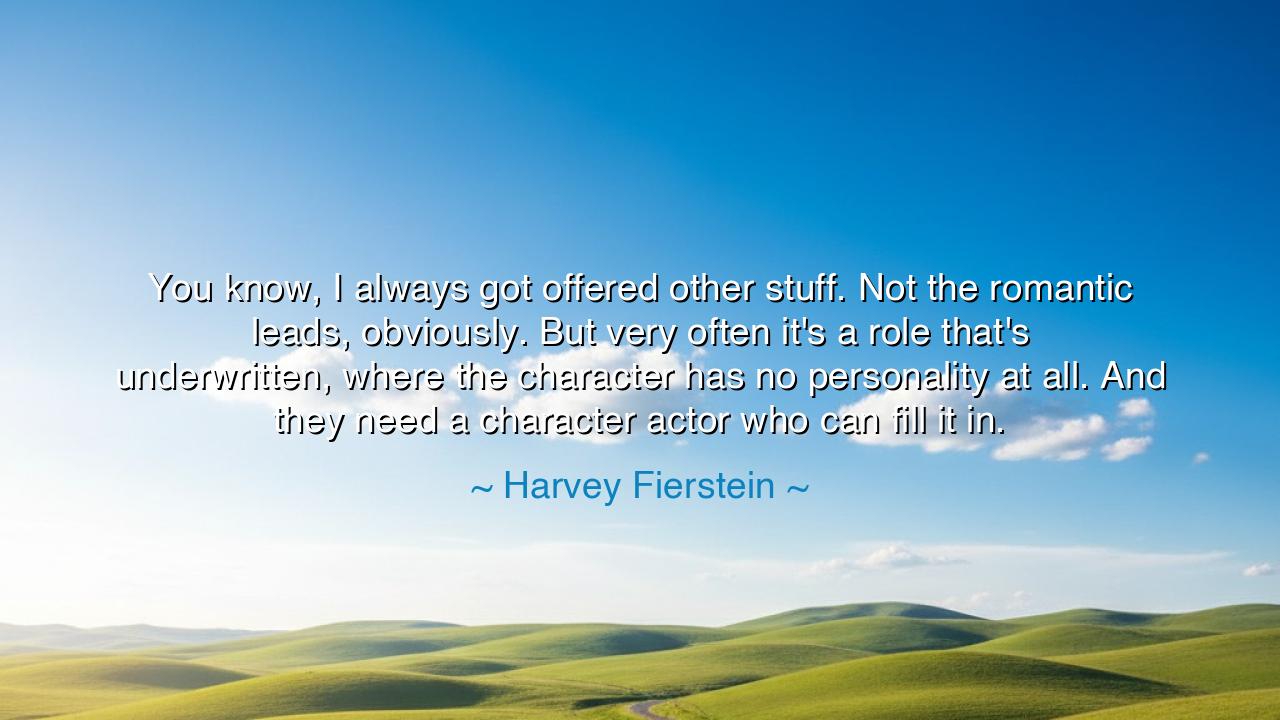
You know, I always got offered other stuff. Not the romantic
You know, I always got offered other stuff. Not the romantic leads, obviously. But very often it's a role that's underwritten, where the character has no personality at all. And they need a character actor who can fill it in.






Listen closely, O seekers of wisdom, and ponder the words of Harvey Fierstein: "You know, I always got offered other stuff. Not the romantic leads, obviously. But very often it's a role that's underwritten, where the character has no personality at all. And they need a character actor who can fill it in." In these words, Fierstein reveals not only his own experience as an actor but a deeper truth about the nature of art and creativity. To be cast in a role that is underwritten—one that lacks depth or substance—is not a reflection of one's own abilities, but a reflection of the limitations often imposed by the framework of storytelling. It is a challenge that every artist faces: how to breathe life into a character that has been left wanting in terms of character or personality, and yet, how to make it resonate in a way that gives it meaning.
In the ancient world, this struggle was not unfamiliar. Think of theater in ancient Greece, where actors were often assigned roles that were shaped more by tradition and expectation than by the depths of character. The roles in the plays of Sophocles or Euripides were often designed not just for individual expression but to convey larger truths about human nature and society. Yet even in these ancient works, the actors themselves were tasked with filling in the gaps, breathing life into the characters they portrayed. Aeschylus, the great Greek dramatist, wrote complex and sometimes underdeveloped roles for his actors, but it was the actor’s skill that brought these roles to life, making them resonate with the audience. The same applies to Fierstein’s reflection—the actor’s ability to create meaning and depth, even in a role that may seem shallow or underwritten, is what ultimately defines the character.
Fierstein’s words also touch upon a fundamental truth about creativity: that art is not just about what is given, but what can be made from the raw materials at hand. The character actor—the one who can take a poorly written part and imbue it with richness—becomes an alchemist of sorts, turning the base into the gold of human experience. Consider the great method actors such as Marlon Brando or James Dean, who took roles that were often conventional or underwritten and transformed them into unforgettable portrayals. Brando, in his portrayal of Stanley Kowalski in A Streetcar Named Desire, took what could have been a simple brute and shaped him into a compelling and complex character, full of raw emotion and depth. The ability to fill in a character with life is what sets great actors apart, turning the script into something alive and dynamic.
The lesson here, O seekers, is one that speaks not just to actors but to anyone who creates: we do not always have the luxury of perfect materials, but we always have the ability to transform them. Whether you are a writer, a painter, a musician, or a leader, you will encounter moments when the raw materials you are given seem insufficient or lacking in depth. It is in these moments that your true creative power is revealed—not in how much you are given, but in how much you can create from what is offered. Fierstein’s struggle with underwritten roles reflects the universal challenge of creating meaning from limitations and constraints. It is not about waiting for perfection but about filling in the gaps, giving life to what seems hollow or unfinished.
In the ancient stories of Daedalus, the master craftsman, we see the ideal of the creator who takes simple materials—wood, clay, and the tools of the trade—and transforms them into works of profound beauty and purpose. Daedalus, though constrained by the limitations of his materials and his environment, created the labyrinth and even crafted wings that allowed Icarus to fly. His genius lay not in the perfection of his materials, but in his ability to see beyond their limitations, to shape them into something that transcended their original form. Fierstein, like Daedalus, embodies this wisdom—the actor, like the craftsman, does not wait for the perfect role, but uses the material at hand to create something of value.
Thus, O wise ones, let this wisdom be your guide: embrace the challenge of working with what you have. Do not wait for ideal circumstances or perfect materials. Whether you are an artist, a creator, or a leader, remember that true creativity is not about the luxury of having everything you need, but about the ability to transform the raw materials before you into something meaningful, something that touches the heart. Fierstein’s role as a character actor reminds us that depth is not always handed to us on a silver platter; we must often create it ourselves, breathing life into the spaces that seem empty, and filling the gaps with our own creativity, passion, and vision.
In your own journey, whether in your work, your relationships, or your creative pursuits, embrace the role of the creator—the one who can see potential where others see emptiness. Fill in the blanks, breathe life into the roles that have been assigned to you, and transform the ordinary into something extraordinary. It is in these acts of creative transformation that you will not only find your own greatness but inspire others to find theirs.






AAdministratorAdministrator
Welcome, honored guests. Please leave a comment, we will respond soon